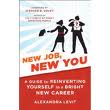 I recently spoke to Alexandra Levit, a nationally recognized business and workplace author and speaker, about her new book, New Job, New You: A Guide to Reinventing Yourself in a Bright New Career. The book is an inspirational read, chock full of stories of people who made successful career transitions despite numerous obstacles and naysayers. This is a must read for anyone contemplating a career change and the stories will leave you feeling energized and empowered and ready to take on a new career. Here’s my Q&A with Alexandra.
I recently spoke to Alexandra Levit, a nationally recognized business and workplace author and speaker, about her new book, New Job, New You: A Guide to Reinventing Yourself in a Bright New Career. The book is an inspirational read, chock full of stories of people who made successful career transitions despite numerous obstacles and naysayers. This is a must read for anyone contemplating a career change and the stories will leave you feeling energized and empowered and ready to take on a new career. Here’s my Q&A with Alexandra.
I understand you are a career changer. Can you tell me what instigated the change?
My second act started mostly by accident. The transition from college to career was extremely difficult for me. I watched as people with half my work ethic got promoted ahead of me, and my first boss hated me so much I thought I had killed her mother in a past life! I was so miserable that I used to crawl under my desk, getting my brand new Nine West suit impossibly wrinkled, and bawl my eyes out. I knew things had to change, so I started taking personal development classes. When things finally started moving in the right direction, I wanted to share what I’d learned with other twenty-something employees. I went out with the idea for a book called They Don’t Teach Corporate in College: A Twenty-Something’s Guide to the Business World. The book was acquired by a small publisher, and I was fortunate that it sold well. I was doing better in my marketing communications career than I ever had before, but the next thing I knew I was being asked to write for respected media outlets and travel around the country to speak. The success of They Don’t Teach Corporate in College, which was originally intended as a side project, had established my platform as a career expert.
What was the motivation/inspiration behind New Job, New You?
Even before the economy tanked, career change was the topic I was most being asked about on college campuses and at association conferences. There were a few books on the topic already, but they all featured stories from renowned executives and celebrities who catapulted to the top 1% of their profession. I couldn’t personally relate to these people because I didn’t understand their motivations and didn’t feel that there was any real chance of becoming that successful. I wanted to write a career change book about normal people, for normal people, that would go down easily like a summer bestseller, and that’s how New Job, New You came about.
Do you think the concept of career change has become more acceptable in recent years? Why or why not?
Definitely. It used to be that only celebrities like Madonna reinvented themselves. But this is the twenty-first century, and the U.S. Bureau of Labor Statistics predicts that the average young American will have about 9 jobs between the ages of 18 and 32, and between 5.3 million and 8.4 million people ages 44 to 70 already are involved in second act careers. Why? Well, today’s employees are simply not content to view a job as a paycheck.
Your book showcases so many wonderful case studies of people who made a career change. How did you find these people?
I put out a call to my network and also advertised on Profnet and Peter Shankman’s Help a Reporter Out site. I got hundreds of wonderful stories – I only wish I could have included them all!
What are your top 3 recommendations for someone who is considering a career change?
1) Learn about yourself. Take time to do a self-assessment of your values, how you like to work, and what you’d be compelled to do even if you never got paid. Research careers and industries that map to your skills and interests. Hit the Internet, set up informational interviews, take relevant coursework, and arrange to go onsite at a company in your chosen field.
2) Don’t be deterred by a lack of experience. In developing a resume and other promotional materials for the field you want to pursue, think about how your current skills and talents apply to the responsibilities you’ll hold in the new job. For example, knowledge of project management, client relations, information technology, and sales will take you far in most types of careers.
3) Have realistic expectations. Even if you are lucky enough to identify your dream job, there’s no such thing as the perfect work situation. Every job has its ups and downs, and aspects we love and aspects we don’t love. And dream job doesn’t mean cushy job. As your mom always told you, anything worth having in this world requires some effort.
What is your advice for someone who is considering a career change but is afraid to give up the stability they have in their current job?
Ease into a new career one foot at a time. Perhaps this means earning a paycheck at your current job while doing a part-time internship in your new field or taking an adult education class or workshop on the weekend. The only way to find out if you’re passionate about something is to try it, while taking minimal risk and sustaining a stable lifestyle.
Alexandra is also the author of How’d You Score That Gig, Success for Hire, and #MillenialTweet. You can also check out her free career change webinar here.


